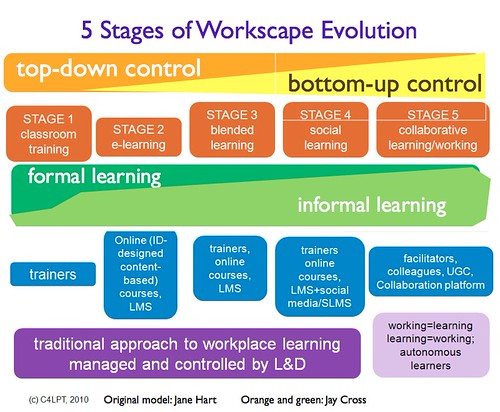It is well documented that the vast majority of learning in the workplace is informal.
According to research undertaken by the Center for Creative Leadership:
- 70% of learning occurs “on the job”
- 20% of learning occurs through feedback from others
- 10% of learning occurs “off the job” (eg attending classes, reading)
This 70:20:10 breakdown has since been supported by subsequent research, though sometimes the ratio is represented as 80:20 to reflect informal learning and formal training respectively.
Yet despite knowing these statistics – and sprouting them at opportune moments – many L&D professionals spend their time, energy and dollars in inverse proportion:
- 80% on formal training
- 20% on informal learning
Jane Hart and Jay Cross visualise this scenario in terms of the workscape evolution: the earlier an organisation is on its learning journey, the more formal and pushed is its training. As its philosophy matures, the process of learning becomes increasingly informal, self-directed and collaborative.
While the evolution of today’s workscape is currently underway, I contend that more must be done by L&D professionals to accelerate its progress.
And one way of doing that is by committing to “informal first”.
What is informal first?
Informal first is a mindset that prioritises informal learning over formal training in practice.
Whenever a development intervention is being considered, the primary objective of the L&D professional should be to provide all the necessary learning resources to the target audience in an open, structured format.
These resources will no doubt include text, but should also include images, audio, video, interactive scenarios, a discussion forum, downloadable job aids… you name it. Whatever is required to make the learning experience authentic and effective.
This pedagogical foundation facilitates pull learning at the convenience and discretion of the learner.
Moreover, it may stand alone to meet the organisation’s development need. In other words, there might be no reason for an employee to ever set foot in a classroom again!

Having said that, in some cases more instructional support will be required.
While “not liking this form of learning” is not a valid excuse in the modern workplace, other drivers might include: the subject matter being complex and thus requiring hand-holding by an SME; or the development need being time sensitive and thus requiring an SME to expedite the upskill; not to mention the fact that some training is just better done instructor-led, for whatever reason.
So, after informal learning has been addressed, sure – supplementary formal training can be considered.
Vive la révolution!
The “informal first” principle revolutionises the corporate learning model.
No longer is formal training the central offering with informal learning relegated to a support role. On the contrary, when we adopt the informal first mindset, informal learning becomes the central offering.
Formal training becomes value add.

Informal Learning First. I love it. Start with the primary way people learn. This reminds me of the flip in thinking around mobile. Google designs first for mobile, then for the PC.
Cheers Jay.
Great post, love the concept of informal first. Maybe in addition to providing resources in an open structured format, sometimes the resources could be in an open unstructured format to encourage intuitive exploration
Thanks Stephen. Yes, I agree. While a structured format provides scaffolding, an unstructured format encourages discovery and exploration (as you say). Thus, I would suggest a mixture of the two – good point!
I totally agree – we learn so much informally, but how to recognise and support this in the workplace. I really like this model to – “informal first”. I think the more we talk about this, the closer we move to being able to integrate the idea into our L&D organisations. Thanks for a great post.
Thanks Michelle!
Hey Ryan,
Great post, do you know of any companies that currently do this?
I have a background in Technical Writing and was responsible for just in time performance support (by way of processes and procedures) and it would have been great to have the L&D area driven by this time of thinking. The training resources would have been really well suited to work hand in hand with our electronic performance support system.
I am now an ID (contractor) and have not worked in an organisation with half as much performance support as the place i first mentioned. Which is a shame because I would love to test out your theory!
Jo
That’s an excellent question, Jo.
I suspect that, currently, the informal first mindset is more likely to be adopted by individuals within a team rather than be an explicit guiding principle for the whole team – but I’d happily be shown otherwise!
“Informal first” is, at least empirically, already the case for most organizations. However, it is not a guiding principle for the focus of those people responsible for learning as you so aptly note. I say it is empirically the case for the following reason that one of my blog posts noted:
“There is nothing like an exception to the way things are done to highlight the need to increase knowledge sharing, especially if the exception is one instance of a pattern that results in bad experiences for customers. As Jay Cross recently noted, people learning at work rely on social, or informal learning, around 80% of the time. Interestingly, I noted in a former post, Social Learning and Exception Handling, that John Hagel and John Seeley Brown contend that “as much as two-thirds of headcount time in major enterprise functions like marketing, manufacturing and supply chain management is spent on exception handling.” It is not a coincidence that the two numbers are aligned.”
http://skilfulminds.com/2011/09/28/social-flow-and-the-paradox-of-exception-handling-in-acm/
As I noted in that post, Dave Gray’s forthcoming book The Connected Company attempts to lay out a framework for thinking about these organizational challenges. I think you may find examples of companies that use “informal first” as an organizing principle.
Thanks for your comment, Larry.
I think I understand the point that you are making: Because most work activity is spent on exception handling, most learning in the workplace is necessarily informal or social – regardless of (or despite!) the pedagogical philosophy of the training department.
This is an important insight, and it leads me to wonder whether the typical organisation has the learning architecture to support it. I would suggest the peer-to-peer knowledge sharing that you speak of at “Social Flow and the Paradox of Exception Handling in ACM” largely relies on an enterprise-wide (or at least team-wide) discussion forum, while the knowledge that is generated should be captured for ongoing reference via an intranet or wiki. I don’t think we’re all there yet.
Yes Ryan, that is the gist of my overall point. Companies that approach the real challenges need much less formal training since it seldom speaks to the reasons work gets done the way it does. When I used to write work procedures in the late 1980s my most important cues to this reality came when specific steps in a procedure required a “Note” to refer to exceptions and how to handle them. The ratio of Notes to steps was a metric I always kept in mind to assess the complexity of the flow of work. The technologies since that time have changed dramatically, however the underlying point remains the same.